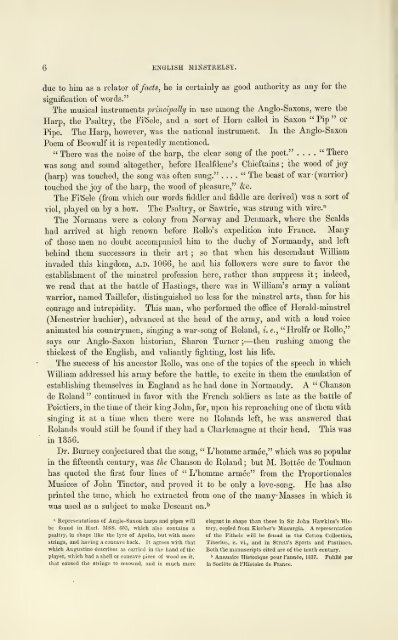Popular music of the olden time. A collection of ancient songs ...
Popular music of the olden time. A collection of ancient songs ...
Popular music of the olden time. A collection of ancient songs ...
Create successful ePaper yourself
Turn your PDF publications into a flip-book with our unique Google optimized e-Paper software.
6 ENGLISH MIlJSTRELSY.<br />
due to him as a relator <strong>of</strong>facts, he is certainly as good authority as any for <strong>the</strong><br />
signification <strong>of</strong> words."<br />
The <strong>music</strong>al instruments principally in<br />
use among <strong>the</strong> Anglo-Saxons, were <strong>the</strong><br />
Harp, <strong>the</strong> Psaltry, <strong>the</strong> Fi^ele, and a sort <strong>of</strong> Hoi-n called in Saxon " Pip " or<br />
Pipe. The Harp, however, was <strong>the</strong> national instrument. In <strong>the</strong> Anglo-Saxon<br />
Poem <strong>of</strong> Beowulf it is repeatedly mentioned.<br />
" There was <strong>the</strong> noise <strong>of</strong> <strong>the</strong> harp, <strong>the</strong> clear song <strong>of</strong> <strong>the</strong> poet." "<br />
. . . . There<br />
was song and sound altoge<strong>the</strong>r, before Healfdene's Chieftains ; <strong>the</strong> wood <strong>of</strong> joy<br />
(harp) was touched, <strong>the</strong> song was <strong>of</strong>ten sung." " The beast <strong>of</strong> war- (warrior)<br />
touched <strong>the</strong> joy <strong>of</strong> <strong>the</strong> harp, <strong>the</strong> wood <strong>of</strong> pleasure," &c.<br />
The FiSele (from which our words fiddler and fiddle are derived) was a sort <strong>of</strong><br />
viol, played on by a bow.<br />
The Psaltry, or Sawtrie, was strung with wire."<br />
The Normans were a colony from Norway and Denmark, where <strong>the</strong> Scalds<br />
had arrived at high renown before Eollo's expedition into France. Many<br />
<strong>of</strong> those men no doubt accompanied him to <strong>the</strong> duchy <strong>of</strong> Normandy, and left<br />
behind <strong>the</strong>m successors in <strong>the</strong>ir art ; so that when his descendant William<br />
invaded this kingdom, a.d. 1066, he and his followers were sure to favor <strong>the</strong><br />
establishment <strong>of</strong> <strong>the</strong> minstrel pr<strong>of</strong>ession here, ra<strong>the</strong>r than suppress it ; indeed,<br />
we read that at <strong>the</strong> battle <strong>of</strong> Hastings, <strong>the</strong>re was in William's army a valiant<br />
warrior, named Taillefer, distinguished no less for <strong>the</strong> minstrel arts, than for his<br />
courage and intrepidity.<br />
This man, who performed <strong>the</strong> <strong>of</strong>lBce <strong>of</strong> Herald-minstrel<br />
(Menestrier huchier) , advanced at <strong>the</strong> head <strong>of</strong> <strong>the</strong> army, and with a loud voice<br />
animated his countrymen, singing a war-song <strong>of</strong> Roland, i. e., "Hrolfr or Rollo,"<br />
says our Anglo-Saxon historian, Sharon Tm-ner ;—<strong>the</strong>n rushing among <strong>the</strong><br />
thickest <strong>of</strong> <strong>the</strong> English, and valiantly fighting, lost his life.<br />
The success <strong>of</strong> his ancestor RoUo, was one <strong>of</strong> <strong>the</strong> topics <strong>of</strong> <strong>the</strong> speech in which<br />
William addressed his army before <strong>the</strong> battle, to<br />
excite in <strong>the</strong>m <strong>the</strong> emulation <strong>of</strong><br />
establishing <strong>the</strong>mselves in England as he had done in Normandy. A " Chanson<br />
de Roland " continued in favor with <strong>the</strong> French soldiers<br />
as late as <strong>the</strong> battle <strong>of</strong><br />
Poictiers, in <strong>the</strong> <strong>time</strong> <strong>of</strong> <strong>the</strong>ir king John, for, upon his reproaching one <strong>of</strong> <strong>the</strong>m with<br />
singing it at a <strong>time</strong> when <strong>the</strong>re were no Rolands left, he was answered that<br />
Rolands would still be found if <strong>the</strong>y had a Charlemagne at <strong>the</strong>ir head.<br />
in 1356.<br />
This was<br />
Dr. Burney conjectured that <strong>the</strong> song, " L'homme armee," which was so popular<br />
in <strong>the</strong> fifteenth century, was <strong>the</strong> Chanson de Roland ;<br />
but M. Bottee de Toulmon<br />
has quoted <strong>the</strong> first foui- lines <strong>of</strong> " L'homme armee" from <strong>the</strong> Proportionales<br />
Musices <strong>of</strong> John Tinctor, and proved it to be only a love-song. He has also<br />
printed <strong>the</strong> tune, which<br />
was used as a, subject to make Descant on.''<br />
he extracted from one <strong>of</strong> <strong>the</strong> many- Masses in which it<br />
" Representations <strong>of</strong> Anglo-Saxon harps and pipes will elegant in shape than those in Sir John Hawkins's Hisbe<br />
found in Harl. MSS. 603, which also contains a toiy, copied from Kircher's Musurgia. A representation<br />
psaltry, in shape like <strong>the</strong> lyre <strong>of</strong> Apollo, but with more <strong>of</strong> <strong>the</strong> Fi<strong>the</strong>le will be found in <strong>the</strong> Cotton Collection,<br />
strings, and having a concave back. It agrees with that Tiberius, c. vi., and in Strult's Sports and Pas<strong>time</strong>s,<br />
which Augustine describes as carried in <strong>the</strong> band <strong>of</strong> <strong>the</strong> Both <strong>the</strong> manuscripts cited are <strong>of</strong> <strong>the</strong> tenth century,<br />
player, which had a shell or concave piece <strong>of</strong> wood on it, •><br />
Annuaire Historique pour I'ann^e, 1837. Public par<br />
that caused <strong>the</strong> strings to resound, and is much more la Societe de VHistoire de France.

















